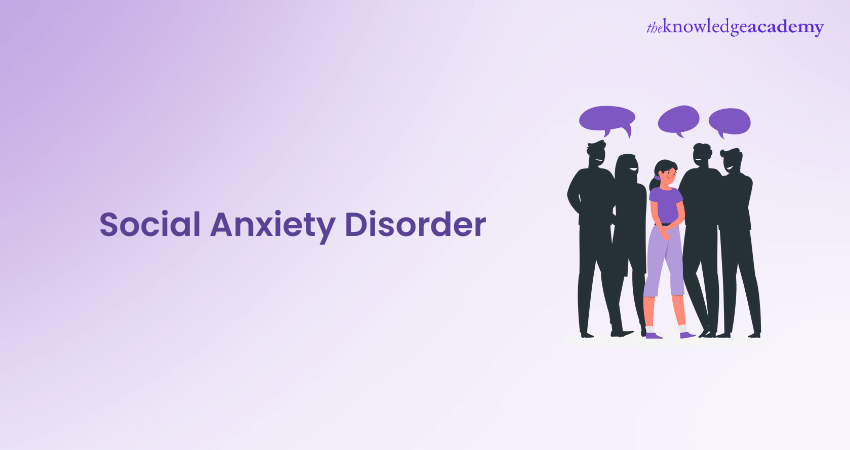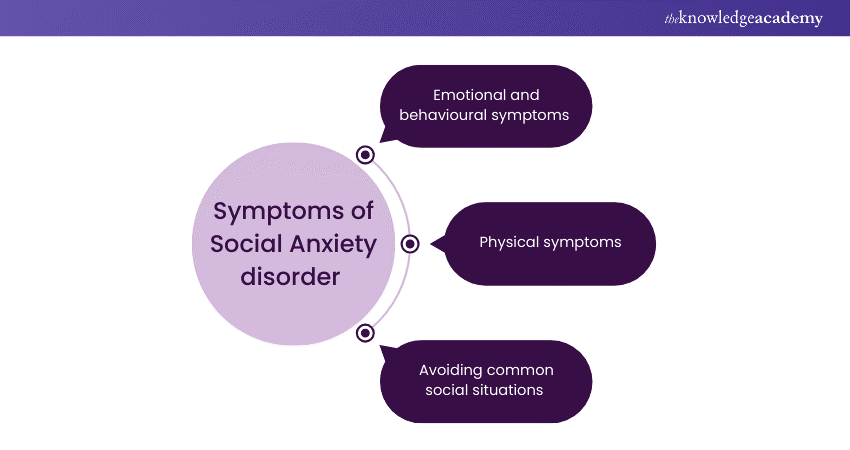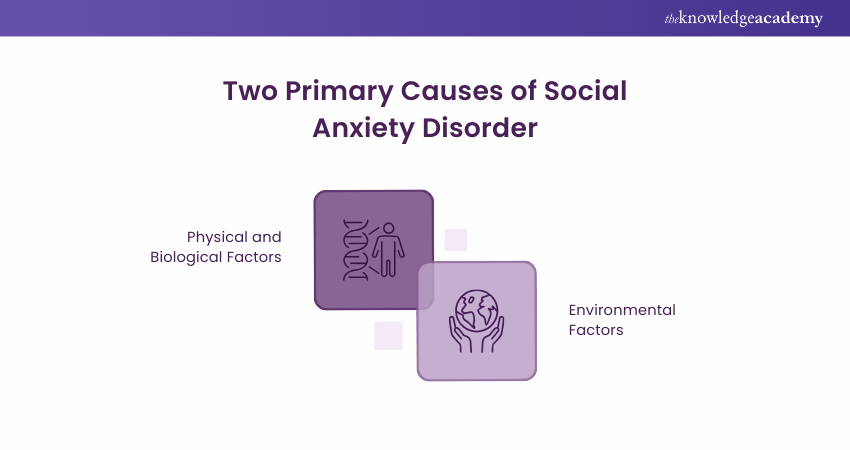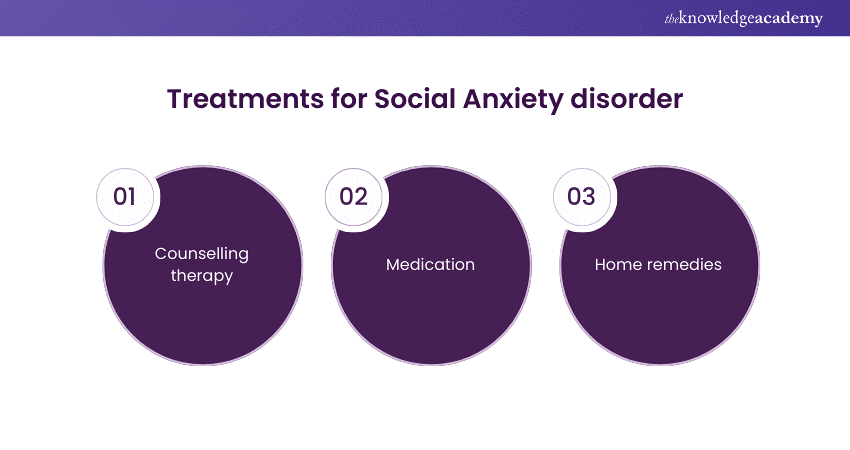We may not have the course you’re looking for. If you enquire or give us a call on +44 1344 203 999 and speak to our training experts, we may still be able to help with your training requirements.
We ensure quality, budget-alignment, and timely delivery by our expert instructors.

Have you ever felt that your heart piques its heartbeat at the thought of speaking up in a meeting or social event for fear of being judged? Thankfully, you are not alone. The National Institute for Health and Care Excellence (NICE) reports that lifetime prevalence rates in Europe range from 3.9% to 13.7%, with an average of 6.7%. This condition is known to disrupt personal growth, relationships, and professional success.
Let’s dive into this blog to cover all the Social Anxiety Disorder’s symptoms, What is Social Anxiety Disorder, causes, and impacts and learn about its effective treatments. Moreover, you will learn about actionable strategies to overcome this challenge and lead a better and more fulfilling life.
Table of Contents
1) Understand What is Social Anxiety Disorder?
2) Symptoms of Social Anxiety Disorder
3) What Causes Social Anxiety Disorder?
4) Diagnosis and Tests
5) Treatments for Social Anxiety Disorder
6) Prevention for Social Anxiety Disorder
7) Conclusion
Understand What is Social Anxiety Disorder
Social Anxiety Disorder, previously known as social phobia, is a mental health condition characterised by an intense and persistent fear of being negatively judged or observed by others.
This disorder is a prevalent form of anxiety.
Individuals with Social Anxiety Disorder experience anxiety or fear in specific or all social situations, such as:
a) Meeting new people.
b) Performing in front of an audience.
c) Making or receiving phone calls.
d) Using public restrooms.
e) Asking for assistance in a restaurant, shop, or other public places.
f) Dating.
g) Answering questions in front of others.
h) Eating in front of others.
i) Participating in interviews.
A fundamental aspect of social anxiety disorder is the fear of being judged, rejected, or humiliated.
Symptoms of Social Anxiety Disorder
Understanding the key symptoms of Social Anxiety Disorder is an essential step toward managing and overcoming its hardcore challenges, especially when exploring Careers for Social Anxiety. Let’s break them down below:

1) Emotional and Behavioural Symptoms
a) Fear of Negative Judgment: You constantly fear that someone judging negatively about you.
b) Embarrassment and Humiliation: You feel a sense of embarrassment or humiliation in social settings.
c) Stranger Anxiety: You may experience intense fear when interacting with unknown people or acquaintances.
d) Visible Anxiety: You fear that others will notice your Anxiety symptoms (e.g., blushing, sweating, trembling) and perceive negative about you.
e) Avoidance Behaviour: You avoid situations or people (even your family members) for fear of embarrassment.
f) Centre of Attention Avoidance: You feel completely distressed about situations where you could be the focus of attention like you're wedding or family party.
g) Anticipatory Anxiety: Anxiety starts running to your veins even before attending any kind of social event.
h) Post-event Analysis: After social interactions, you analyse your social interactive performance and focus on perceived flaws.
i) Catastrophic Thinking: You expect the worst possible outcomes arising from negative experiences.
2) Physical Symptoms
a) Blushing
b) Rapid heartbeat
c) Trembling
d) Sweating
e) Upset stomach or nausea
f) Shortness of breath
g) Dizziness
h) Feeling mentally blank
i) Muscle tension
3) Avoiding Common Social Situations
a) Interacting with unknown people
b) Attending parties or gatherings
c) Going to work or school
d) Initiating conversations
e) Making eye contact
f) Entering a room full of seated people
g) Returning items to a store
h) Eating in front of others
i) Using public washrooms
Transform your understanding of Social Psychology- register for our Social Psychology Training today!
What Causes Social Anxiety Disorder?
The exact cause behind Social Anxiety Disorder is still uncertain for scientists worldwide. However, it likely results from a combination of factors. Let’s explore these factors in-depth:

1) Physical and Biological Factors
a) Neurotransmitter Systems: Mental issues due to neurotransmitter systems can stem from the imbalancing of hormones like Serotonin, Dopamine, And Glutamate. These neurotransmitters are known to reduce mood regulation.
b) Genetic Predisposition: Anxiety Disorders, such as Social Anxiety, can be triggered by family medical histories as well. However, whether this is due to hereditary traits or common environmental impacts is still unclear for scientists worldwide.
2) Environmental Factors
a) Negative Experiences: Traumatic or humiliating social events can also result in Social Anxiety Disorder. These negative experiences may lead to symptoms similar to those of Post-traumatic Stress Disorder (PTSD).
b) Parenting Styles: Overprotective parenting styles or insecure attachments with their children can play a key role here.
c) Peer Interactions: Negative interactions with peers can contribute to Social Anxiety disorder.
Level up your Mental Health with our Mental Health and Wellbeing Training- join today!
Diagnosis and Tests
An early and accurate diagnosis of Social Anxiety Disorder is highly essential for developing an effective treatment plan. Thus, Mental Health professionals utilise a set of scientific approaches to analyse symptoms and how they impact daily lives.
How Is Social Anxiety Disorder Diagnosed?
Healthcare professionals diagnose Social Anxiety Disorder by evaluating a person's symptoms against criteria outlined in the DSM-5 Diagnostic and Statistical Manual of Mental Disorders).
This involves assessing the intensity and duration of Anxiety in social situations, as well as its impact on daily functioning. A comprehensive clinical interview helps determine if the Anxiety is disproportionate to the situation and persistent over time.
Is There a Test to Diagnose Social Anxiety Disorder?
While there isn't a specific laboratory test for diagnosing Social Anxiety Disorder, Mental Health professionals utilise standardised assessment tools and questionnaires to gauge the severity of symptoms. These instruments, combined with clinical interviews, assist in identifying patterns of avoidance and fear in social contexts, leading to an accurate diagnosis.
Treatments for Social Anxiety Disorder
Effective treatment can predominantly improve the quality of life for individuals struggling with Social Anxiety Disorder. This approach empowers them to face social situations with confidence. Here are the various treatments available for tackling Social Anxiety Disorder:

1) Counselling Therapy
a) Counselling Therapy
Counselling therapy offers the flexibility of one-on-one or group sessions, allowing individuals to discuss their concerns in a safe and supportive environment. These in-person or online sessions cater to diverse needs and preferences. In addition, this approach ensures accessibility and convenience, making it easier for individuals to seek help and work toward overcoming their challenges.
b) Cognitive Behavioural Therapy (CBT):
Cognitive Behavioural Therapy (CBT) helps individuals to manage Anxiety by identifying and transforming negative thought patterns into positive and constructive ones. It also introduces effective strategies to cope with the uncertainties of stressful situations. This strategy equips individuals with practical tools that help them navigate challenges with confidence and resilience.
c) Acceptance and Commitment Therapy (ACT):
Acceptance and Commitment Therapy (ACT) focuses mainly on teaching mindfulness techniques and practical strategies to help individuals stay grounded in the present moment. It also encourages us to embrace emotions rather than avoid them. This enables individuals to pursue a life aligned with their values and goals, even when facing challenging emotions or circumstances.
d) Group Therapy and Support Groups:
Group therapy and support groups provide a friendly community environment where individuals can enhance their Social Anxiety Coping Skills, by sharing the experiences and practices, they undertake. These settings help participants realise that they are not alone in their struggles. Such strategies foster a sense of connection and mutual encouragement while working toward overcoming social Anxiety.
e) Exposure Therapy:
Exposure therapy, guided by a trained healthcare professional, helps individuals confront and gradually engage with social situations they typically avoid. This step-by-step approach allows them to face their fears in a controlled and supportive environment. Such pursuit further reduces their Anxiety levels over time and builds confidence in managing challenging social interactions.
2) Social Anxiety Disorder Medication
Medications are a vital part of managing Social Anxiety Disorder. They helps to improve symptoms and functionality in your daily life.
a) Selective Serotonin Reuptake Inhibitors (SSRIs) include Paroxetine (Paxil) and Dertraline (Zoloft). It generally takes several weeks to become effective.
b) Selective Norepinephrine Reuptake Inhibitors (SNRIs) such as Venlafaxine (Effexor).
c) Propranolol, unlike SSRIs and SNRIs, is a fast-acting beta-blocker that can be used as needed.
[Note: It’s highly recommended to consult with the doctor behind consuming these medicines.]
3) Home Remedies for Social Anxiety Disorder
Supporting professional treatment with home remedies can enhance the results and boost your overall Mental Health. Some of the key methods to manage stress and Anxiety Stress Disorder at home include: managing stress and anxiety through simple techniques like mindfulness, relaxation, and proper sleep.
a) Breathing Exercises: Simple breathing techniques such as deep breathing can easily control the physical symptoms of Anxiety.
b) Mindfulness and Meditation: Regular mindfulness and meditation practices are known to promote a state of awareness and calmness significantly.
c) Physical Exercise: You can even perform activities like Yoga and Tai Chi to impede stress levels.
d) Diet and Lifestyle: Avoiding stimulants like Caffeine and maintaining a regular sleep schedule, alongside engaging in regular physical activities, can be excellent and sure ways to promote overall mental well-being.
e) Education: You must also stay educated about Anxiety and its impacts to handle their condition better.
f) Support Networks: Having someone trustworthy to talk to, whether a friend, family member, or therapist, can provide emotional support and guidance.
Prevention for Social Anxiety Disorder
While it's impossible to predict who can suffer from Anxiety disorder, there are proactive steps you can take to mitigate the symptoms. Listed below are a few of those symptoms:
1) Seek Early Intervention:
Taking early action to address Social Anxiety Disorders can significantly improve the chances of treatment. Early intervention can effectively manage symptoms by preventing them from worsening and improving overall quality of life.
2) Maintain a Journal:
Keeping a journal allows individuals to document daily experiences, providing valuable insights into their thoughts and behaviours. It helps identify stress triggers and recognise activities or patterns that contribute to improved mood and well-being.
3) Prioritise Your Activities:
Effective time and energy management helps individuals stay focused on what is truly needed. Striking a balance between responsibilities and enjoyable activities promotes better mental well-being and a more fulfilling lifestyle.
4) Steer Clear of Harmful Substances:
Avoiding substances like alcohol, drugs, Caffeine, and nicotine is important, as they can significantly worsen Anxiety symptoms and hinder recovery. If struggling with addiction, seeking professional help is a vital step toward improving Mental Health and overall well-being.
Boost your Counselling expertise with our Counselling Course- begin creating differences today!
Conclusion
We hope you understand this topic of Social Anxiety Disorder. It can be a predominant issue that needs to be properly handled and overcome. However, using the correct techniques and resources, you can prevent and minimise this disorder. Always keep in mind that you should seek help when required and take an important step in this journey.
Learn to manage stress effectively in our Handle Stress and Develop Your Resilience Course – Unplug your mind and recharge your life today!
Frequently Asked Questions
How does Social Anxiety affect everyday life?

Social Anxiety disrupts daily life by causing intense fear in social situations, leading to avoidance of interactions and opportunities. Furthermore, it affects personal relationships, job performance, and self-esteem, often resulting in isolation and reduced quality of life.
What happens if Social Anxiety is left untreated?

If left untreated, Social Anxiety can worsen over time, which can lead to severe isolation, depression, and low self-esteem. It may also impair academic or job performance and disrupt personal relationships. Further, it significantly reduces the overall quality of life and emotional well-being.
What are the other resources and offers provided by The Knowledge Academy?

The Knowledge Academy takes global learning to new heights, offering over 3,000 online courses across 490+ locations in 190+ countries. This expansive reach ensures accessibility and convenience for learners worldwide.
Alongside our diverse Online Course Catalogue, encompassing 19 major categories, we go the extra mile by providing a plethora of free educational Online Resources like News updates, Blogs, videos, webinars, and interview questions. Tailoring learning experiences further, professionals can maximise value with customisable Course Bundles of TKA.
What is the Knowledge Pass, and how Does it Work?

The Knowledge Academy’s Knowledge Pass, a prepaid voucher, adds another layer of flexibility, allowing course bookings over a 12-month period. Join us on a journey where education knows no bounds.
What Are Related Courses and Blogs Provided by the Knowledge Academy?

The Knowledge Academy offers various Mental Health Training, including Anxiety Courses, Counselling Masterclass and Social Psychology Training. These courses cater to different skill levels, providing comprehensive insights into Child Psychology.
Our Health & Safety Blogs cover a range of topics related to Social Anxiety Training, offering valuable resources, best practices, and industry insights. Whether you are a beginner or looking to advance your Mental Health skills, The Knowledge Academy's diverse courses and informative blogs have you covered.
Upcoming Health & Safety Resources Batches & Dates
Date
 Anxiety Courses
Anxiety Courses
Fri 20th Jun 2025
Fri 22nd Aug 2025
Fri 17th Oct 2025
Fri 19th Dec 2025






 Top Rated Course
Top Rated Course



 If you wish to make any changes to your course, please
If you wish to make any changes to your course, please


